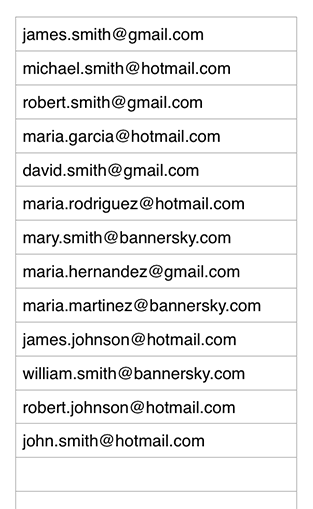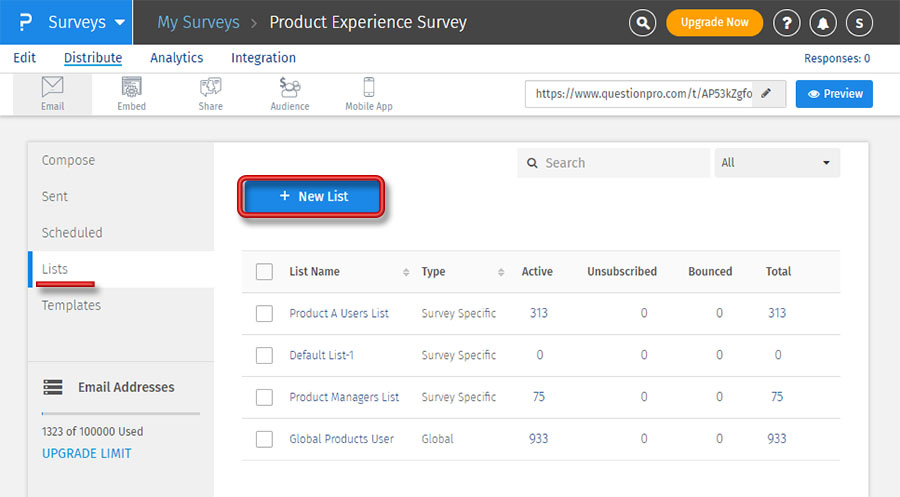What Should I Consider When Buying The Hospital Chief Executive Email List?
It is important to consider the following aspects when buying an email database of hospital CEOs. The data must be reliable, accurate and in compliance with all laws and regulations. Below is a breakdown of the main factors that need to consider: 1. Data Accuracy, Quality and Reliability
Source of Data: Confirm that the list provider is using reputable sources such as professional databases, business directory listings, or verified opt-ins. A reliable database can lower the possibility of incorrect data.
Verification Process: Check the frequency with the rate at which data is changed. Incorrect email addresses can result in excessive bounce rates, which could affect your reputation and marketing.
Segmentation and Filters: Be sure that the list is segmentable such as by location, size of hospital, type of hospital (e.g. public or private), and particular areas of expertise. Targeted marketing is more effective than broad marketing.
Email Deliverability: See whether the provider has a guarantee regarding deliverability rates. The high rate of bounces can have a an adverse effect on your domain’s reputation for sending emails.
2. Conformity to Legal Regulations
Data Privacy Laws. Make sure that your email list is compliant with regulations such as the General Data Protection Regulation in Europe as well as the California Consumer Privacy Act in the U.S. Make sure that the data collected was done by consent and used responsibly.
CANSPAM Act : If reside located in the U.S.A. be sure that your list complies with CANSPAM Act. It governs commercial email. Penalties could be imposed in the event of non-compliance.
Permission-Based Marketing: Be sure that the CEOs of the companies have consented to receive emails. If you send an email that is not invited, it could damage your brand image and could result in penalties.
3. Provider Reputation
Review and Testimonials – Examine the credibility of the company by reading reviews online, testimonials as well as case studies. Get positive feedback from customers from similar industries.
Transparency. Transparency is essential in the way the data is collected and updated. Avoid providers who are unable to explain the process they use for collecting data.
Customer Support: Select one that offers a comprehensive customer support. It is possible that you require assistance in modifying your data, navigating technical issues, or understanding legal obligations.
4. Cost and Value
Pricing Model: Different vendors have different pricing models (e.g. pay-per-lead or pay-per-lead models, subscription, or flat-fee models). Examine the various options to make sure that the cost is in line with your budget and expected ROI (ROI).
Refund Policy. Search for a company which has the option of a replacement or return policy if your email address or contact number does not meet your requirements.
Other Services: A few vendors offer additional services such as the management of email campaigns, integration with CRM or marketing automation. Consider whether these add-ons will aid your business.
5. Data Usage
Exclusive vs. Shared Lists – Decide the email list you are using exclusively for your business, or shared among several buyers. Exclusive lists will lead to better engagement. Shared lists can lead to crowd fatigue due to excessive contact.
Understanding Ownership & Licensing: Determine if the data is yours once purchased or if it’s just an one-time license. To access it continuously it is possible to pay for recurring fees.
6. Data Integration and Format
Compatibility with CRM: Make sure that the email list you’re using is able to be seamlessly integrated to your CRM or email marketing tools. Look for formats that are common, such as CSV or Excel.
User-Friendliness: Consider the ease with which it is to manage the data, filter and segment it after purchasing the product. Data that is manipulated in a complex way might not be worth the price.
7. Ethical Questions
Hospital CEOs have a lot of work on their plate. Be sure your outreach is beneficial and pertinent to the hospital’s CEO’s work. messages that are not relevant or distracting could damage your reputation.
Avoid spamming: Sending multiple emails to recipients can be considered spam, and can damage your reputation as a sender of emails. Plan a well-timed, strategic outreach to avoid this problem.
The article’s conclusion is:
The purchase of a hospital CEO email list could be a valuable investment when approached in a strategic manner. Prioritize the quality of data, legal compliance and relevancy to ensure that your outreach efforts are effective and appreciated. Be sure to thoroughly research and fully understand the terms used by your data provider to maximize the return on investment as well as maintain the highest ethical and legal standards. See the top hospital ceo email list for blog info.
What Should I Think About Prior To Purchasing A Data Appending Device?
When considering data appending services it is crucial to consider multiple factors to ensure the appending service improves the quality of your data while maintaining compliance, accuracy, and ethical standards. Data appending involves enriching your database by incorporating missing or additional data such as email addresses, phone numbers, or demographic details. Below are a few important factors to take into consideration when buying data appending service:1. Quality and accuracy of the data
Source of Data: Ensure the data provider is using reliable quality sources like verified databases, public records, or directories with opt-in options. The most reliable data providers usually get their data from reliable sources. This will ensure that the information appended is accurate and up-to-date.
Verification Process – Examine to see if the provider has an effective process to validate and verify the data you have added. This helps ensure the data is current, accurate and appropriate to your needs. As part of the service provided by your provider, you should expect regular updates and cleansing of data.
Match Rate: Every provider has a unique match rate which is the proportion of records that you can enhance with the addition of new data. Try to strike a balance between a high match rate and data accuracy. High match rates are essential, but not at the expense of the quality of your data.
Customization: Ensure that the service provider offers customizable solutions for data append. This can include adding various kinds of data, such as firmographic data and demographics, as well as behavioral information.
2. Data Security and Privacy
Conformity with regulations : Data appending is a process that involves handling personal data and therefore the appending service has to comply with relevant privacy laws and regulations. These include General Data Protection Regulation (GDPR) as well as the California Consumer Privacy Act(CCPA), as well as any other privacy laws applicable. Data appended must be gathered, used, and processed legally in order to be protected from penalties.
Consent Management – Make sure that the data is from individuals that have consented explicitly to sharing their personal information. Avoid data sources which use methods that are not trustworthy or violate privacy. They can lead to ethical and legal problems.
Data Security: Make sure that the service provider has strict security measures for data to ensure the confidentiality and integrity of your database as well as any information you add to it. This includes data transfer protocols that are secure along with encryption, access, and controls.
3. Provider Reputation
Reputable Vendor: Select one with a solid reputation for delivering exact and compliant services for data appending. Review their reviews, testimonials, or case studies to determine their record. A reputable vendor is more likely to offer high-quality services and ensure legal conformity.
Specialization by industry: Some service providers are focused on certain industries, for example healthcare, finance or retail. It is important to choose an organization that is skilled and knowledgeable in your industry if you work in a specific area. They may be able to provide tailored solutions that meet your particular needs.
4. Cost and Return on Investment (ROI).
Pricing Models. Data appending providers provide a variety of pricing options. These include fixed fees and pricing per record. Be aware of the pricing structure and the way it is aligned to your budget. Beware of low-cost alternatives that may have poor data.
Determine the potential ROI of your investment by adding data. A good service will help you improve your marketing performance, increase engagement and boost conversion rates. Comparing the price of a service versus the gains you can expect to see from having better and more actionable information is a great way to assess the value of a service.
5. Appending and Data Types
Types: Determine the types of data that you want to be appended to your databases. The most common types are:
Email addresses are vital to email marketing campaigns.
Telephone numbers are crucial for sales outreach and customer service.
Demographic Data: Helpful for segmentation and targeting in marketing.
Firmographic Data is important for B2B marketers that want to target businesses based on the amount of revenue, employees’ size, or industry.
Social Media Profiles Several companies offer the option of adding social media handles to their online and digital marketing efforts.
6. Data Format and Integration
Compatibility: Ensure that the attached data is provided in a format compatible with your CRM system. (CRM) system, marketing automation software, or other tools you use. CSV, Excel or API integration are all standard formats that facilitate the transfer and utilize data.
Data enrichment and cleaning: A good appending provider should offer data cleaning services in addition. This includes correcting inaccurate data as well as removing duplicate data and outdated records. Data enrichment is more than just adding new information–it also improves the overall quality of your existing database.
7. Ethical considerations
Transparency: Service providers must be transparent about the origin of appended data and how they’re gathered. The ethical data appending service has strict guidelines for the collection and use of data and will make sure that data is collected in a transparent and legal method.
Impact on Engagement: Be mindful that appending contact information, such as emails or phone numbers should not lead to spammy or invasive practices. Use the appended information responsibly and make sure you adhere to best practices in regards to outreach, opt-out options, and the privacy of consumers.
Conclusion
When you purchase data appending, be sure to consider the quality of data, legal compliance, as well as provider reputation. Select services that provide secure, validated data that meets privacy regulations including GDPR as well as CCPA. In addition, ensure that the appended data is compatible with your systems and think about the long-term benefits by investing in accurate, enhanced data. By choosing the right provider and focusing on ethical business practices the process of data appending can greatly enhance your marketing efforts and overall business performance. Read the pro data appending services for blog advice.